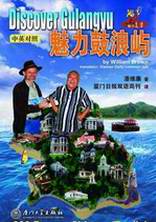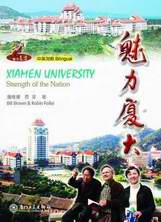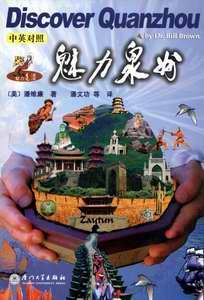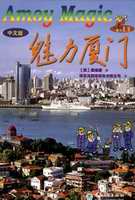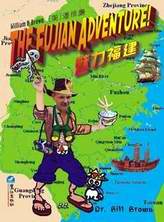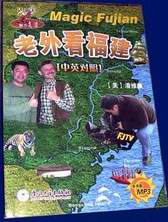![]() Click
to
Access
Click
to
Access
OUTSIDE China
![]() Click
to Access
Click
to Access
INSIDE
China ![]()
TRAVEL LINKS
![]() Xiamen
Xiamen
![]() Gulangyu
Gulangyu
![]() Jimei
Jimei
![]() Tong'an
Tong'an
![]() Jinmen
Jinmen
![]() Zhangzhou
Zhangzhou
![]() Quanzhou
Quanzhou
![]() Wuyi
Wuyi
![]() #1Fujian
Sites!
#1Fujian
Sites!
![]() Fujian
Foto Album
Fujian
Foto Album
![]() Books
on Fujian
Books
on Fujian
![]() Readers'Letters
Readers'Letters
![]() Ningde
Ningde
![]() Zhouning
Zhouning
![]() Longyan
Longyan
![]() Sanming
Sanming
![]() Putian
Putian
![]() Bridges
Bridges
![]() Travel
Info,
Travel
Info,
![]() Hakka
Roundhouses
Hakka
Roundhouses
![]() Travel
Agents
Travel
Agents
MISC. LINKS
![]() Amoy
People!
Amoy
People! ![]()
![]() Darwin
Driving
Darwin
Driving ![]()
![]() Amoy
Tigers
Amoy
Tigers
![]() Chinese
Inventions
Chinese
Inventions
![]() Tibet
in 80 Days!
Tibet
in 80 Days!![]()
![]() Dethroned!
Dethroned!
![]()
![]() Misc.Writings
Misc.Writings
![]() Latest
News
Latest
News
![]() Lord
of Opium
Lord
of Opium
![]() Back
to Main Page
Back
to Main Page
![]() Order
Books
Order
Books![]() Xiamenguide
Forum
Xiamenguide
Forum 
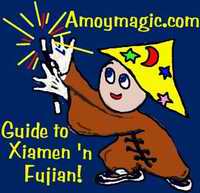
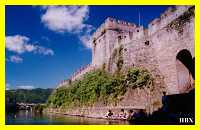 Business
Links
Recreation Links Google
Search E-mail
Business
Links
Recreation Links Google
Search E-mail
"Journey
to Hakka Hamlet of Tufang!"
(Click Thumbnails for larger images)
Click for Changting
Page 1 (Intro)
Click for Changting
Page 2 (Hakka Museum, Old Town, Hakka Maids, etc.)
Click for Changting
Page 3 (Hakka Cuisine and "Drinking Culture")
Click for Changting
Page 4 (Changting--Lil' Red Religious Center)
Rise
and Shine! Martial music blaring from loudspeakers roused
me from bed the next morning at 6:00 AM. Chinese love loudspeakers. Even
farmers in their fields can guide their water buffalo to the accompaniment
of news reports, exhortations and admonitions, and music ranging from
the national anthem to the Beatles and ManciniˇŻs ˇ°Baby Elephant Walk.ˇ±
Chinese without alarm clocks may appreciate the wake-up call, and the
lively counting that accompanies folks performing their jumping jacks,
knee bends, and push-ups. But my alarm clock is built in and it wasnˇŻt
set for 6:00 AMˇŞor any other time. I preferred to rise when the Spirit
moved me. I jammed in my earplugs so tightly they met behind my nose,
but to no avail. I finally fell out of bed, struggled to my feet and ate
the ˇ®saltyˇŻ rolls IˇŻd bought the previous night.
Chinese say bread is either sweet or salty (salty meaning itˇŻs not sweet). My Changting rolls werenˇŻt sweet, but they were drenched in what looked like 40W motor oil, and stuffed with shredded pork and hot dog (not, I hoped, remnants of someoneˇŻs puppy in a pot). IˇŻm usually careful what I eat, for as Isaac Newton almost said, ˇ°What goes down must come up .ˇ± But the rolls were actually quite tasty, especially when washed down with lukecold instant coffee.
About 6:30, firecrackers
went off in the distance. At night it might have signaled at banquet,
but at that time of morning they were either from a monastery, wedding,
or a funeral. I joked to my friend that maybe it was Red Army gunfire.
He said, ˇ°The Red Army did use firecrackers! They didnˇŻt have weapons
so they scared off the Kuomintang with volleys of noisy but harmless firecrackers!ˇ±
Firecrackers are now banned in cities like Beijing, Shanghai, and Xiamen,
where we just play cassette recordings of firecrackers on giant amplified
sound systemsˇŞor pop hundreds of balloons with pins. But towns like Changting
still get a bang out of fireworksˇŞfrom dawn to dusk.
Hakka
Hamlet of TuFang (Íż·»)
After a hasty breakfast (at least by Chinese standards; it took half an
hour), we set out to see the prototype of the museumˇŻs miniature Hakka
Hamlet.
 Babushka warned, ˇ°ItˇŻs pretty bad road,ˇ± but I figured it couldnˇŻt
be any worse than roads weˇŻd crossed in the Gobi Desert or Tibet. So
we headed east on the 319 highway, past HeTian (şÓĚď), home of the famous
HeTian chickens, towards South Mountain Town (ÄĎÉ˝, NanShan).
Babushka warned, ˇ°ItˇŻs pretty bad road,ˇ± but I figured it couldnˇŻt
be any worse than roads weˇŻd crossed in the Gobi Desert or Tibet. So
we headed east on the 319 highway, past HeTian (şÓĚď), home of the famous
HeTian chickens, towards South Mountain Town (ÄĎÉ˝, NanShan).
 ChangtingˇŻs
countryside is unspoiled because
ChangtingˇŻs
countryside is unspoiled because  of
its relatively small population. The water is so clean locals drink it
straight. The entire countryside is laid out in green plaidsˇŞgrains,
vegetables, and field after field of the famous Changting tobacco with
velvety leaves large enough to make a small umbrella. The aroma of orange
blossoms wafting in the breeze reminded me of Florida. Changting is experimenting,
quite successfully, with American oranges.
of
its relatively small population. The water is so clean locals drink it
straight. The entire countryside is laid out in green plaidsˇŞgrains,
vegetables, and field after field of the famous Changting tobacco with
velvety leaves large enough to make a small umbrella. The aroma of orange
blossoms wafting in the breeze reminded me of Florida. Changting is experimenting,
quite successfully, with American oranges.
Red-cheeked children in white and blue uniforms and red kerchiefs carried
knapsacks and plastic umbrellas advertising a local beer. Several shouted
ˇ°Hello! How wa you! O.K!ˇ± (Chinese children must begin English study
by at least 7th grade).

 A water buffaloˇŻs calf was almost as shaggy as a Tibetan yak. It
looked like someone had curled its hair. The humble Hakka farmstead behind
the cows was fashioned from native earthen bricks, but the weeds between
the bricks suggested it was returning to the earth that gave it birth.
A water buffaloˇŻs calf was almost as shaggy as a Tibetan yak. It
looked like someone had curled its hair. The humble Hakka farmstead behind
the cows was fashioned from native earthen bricks, but the weeds between
the bricks suggested it was returning to the earth that gave it birth.
 Reconnaissance A sign about
an hour southeast of Changting read, ˇ°Pengkou 29 km, Longyan 113 km,
TuFang 15 km.ˇ± The Tufang road was a wide serpentine path winding south
through an idyllic valley of tobacco fields, streams, ancient wood and
stone villages, bridges, and towering stone aqueducts. I stopped for a
photo. A lady sat under an umbrella selling cigarettes, bottled water,
dried fruit, and soft drinks. She asked, ˇ°What are you photographing?ˇ±
Reconnaissance A sign about
an hour southeast of Changting read, ˇ°Pengkou 29 km, Longyan 113 km,
TuFang 15 km.ˇ± The Tufang road was a wide serpentine path winding south
through an idyllic valley of tobacco fields, streams, ancient wood and
stone villages, bridges, and towering stone aqueducts. I stopped for a
photo. A lady sat under an umbrella selling cigarettes, bottled water,
dried fruit, and soft drinks. She asked, ˇ°What are you photographing?ˇ±
ˇ°The fields,ˇ± I said.
ˇ°Why?ˇ± she asked. ˇ°TheyˇŻre just ordinary fields.ˇ± She mumbled, ˇ°Foreigners!ˇ±
I started to joke about reconnaissance, but bit my tongue. That line of
humor could get me in trouble. Someday my wit will join with my lack of
wits to hang me. ItˇŻs No wonder Susan Marie always complains, ˇ°Bill,
be serious!ˇ± She even laughed when I asked her to marry me. Tough for
the ego when you steel yourself to propose and the girl laughs in your
face and says, ˇ°YouˇŻre kidding, arenˇŻt you?ˇ±
But life is short, and laughter lengthens it. And so does good air, at
least according to Babushka. The air was so crisp and clean that I could
taste the river in the distance. Babushka said, ˇ°Clean air and pure water
not only gives us beautiful girls but also long lives to enjoy them!ˇ±
Bosoms Babushka pulled from
his camera bag a colorfully  embroidered
Hakka maidˇŻs apron. ˇ°I bought this for only two Yuan!ˇ± he said. ˇ°I
like photographing beautiful Hakka girls wearing this apron. They have
such nice little bosoms.ˇ±
embroidered
Hakka maidˇŻs apron. ˇ°I bought this for only two Yuan!ˇ± he said. ˇ°I
like photographing beautiful Hakka girls wearing this apron. They have
such nice little bosoms.ˇ±
If I tried that, Susan Marie would use the apron around my neck. But I
hoped that maybe I could buy one of the handwoven palm fiber raincapes
that are rapidly being replaced by plastic raincoats.
Endless rows of freshly
pressed bricks, piled ten high, under plastic sheets, varied in color
from red to black and yellow, depending upon the soil. Bricks, bricks,
and more bricksˇŞa far cry from the fine Tang and Song Dynasty ceramics
produced here a mere 1,000 years ago, though more practical. Who needs
a porcelain home or outhouse?
A few miles down the road it started to rain and our view vanished as
poor Toy Ota was covered in mud. Fortunately, we soon came to a paved
road, and a long lost work of Revolutionary art.
The
Chuanxin Zou Malou farmstead, (´©ĐÄ×ßÂíÂĄ) in Yang
in Yang  KengCun
Hamlet (ŃóżÓ´ĺ), must have been a beauty in its time. But now the white
plaster panels and intricate wooden beams and columns are falling to pieces.
The enclosed pond is covered with scum. Cows graze on the thistles and
grass in the abandoned buildings, and every room is filled with piles
of straw and rubbish. One can almost feel the ghosts of farmersˇŞand soldiers
bent on routing the foreign devils!
KengCun
Hamlet (ŃóżÓ´ĺ), must have been a beauty in its time. But now the white
plaster panels and intricate wooden beams and columns are falling to pieces.
The enclosed pond is covered with scum. Cows graze on the thistles and
grass in the abandoned buildings, and every room is filled with piles
of straw and rubbish. One can almost feel the ghosts of farmersˇŞand soldiers
bent on routing the foreign devils!

 In the 20s or 30s, Revolutionary artists painted cartoons and propaganda
on the white plaster sections. Block characters in blood red ink literally
shouted slogans like, ˇ°The People are the only force of history!ˇ± An
elaborate cartoon on one panel showed Red Army soldiers thoroughly trouncing
the Japanese.
In the 20s or 30s, Revolutionary artists painted cartoons and propaganda
on the white plaster sections. Block characters in blood red ink literally
shouted slogans like, ˇ°The People are the only force of history!ˇ± An
elaborate cartoon on one panel showed Red Army soldiers thoroughly trouncing
the Japanese.
 But
the artwork, like the farm, was falling to pieces, the victim of time
and vandalism. The normally ebullient Babushka
But
the artwork, like the farm, was falling to pieces, the victim of time
and vandalism. The normally ebullient Babushka  complained
bitterly, ˇ°These should be in a museum. They are crumbling before my
eyes, and soon all weˇŻll have left are my photos.ˇ± (His sentiments were
echoed by Wuyi MountainˇŻs famed photographer, Wu Guangmin (ÎâąâĂ÷).
complained
bitterly, ˇ°These should be in a museum. They are crumbling before my
eyes, and soon all weˇŻll have left are my photos.ˇ± (His sentiments were
echoed by Wuyi MountainˇŻs famed photographer, Wu Guangmin (ÎâąâĂ÷).
AlasˇŞmy flash was dead, so no photos. Next time!
Tufang Town (Íż·») had a
nice concrete main street, but it was a poor place, with rows of modern
brick buildings in various states of incompletion, behind which were dozens
of classic Hakka earthen homes. The hamletˇŻs two gas stations were pumps
set 
 inside
houses. Apathetic attendants perched patiently beside the pumpsˇŞcigarettes
in hand. I was glad I had a full tank.
inside
houses. Apathetic attendants perched patiently beside the pumpsˇŞcigarettes
in hand. I was glad I had a full tank.
TufangˇŻs headman invited us to his office for tea and a chat. He was
tall, well built, well dressed, and obviously well educated. I imagined
he was pretty surprised to have a foreigner show up in his little two-ox
town, but the surprise was on me!
Small, Small World!
Bill and Kitty Job  settled
in Xiamen in 1987. Since you canˇŻt really expect someone from Tennessee
to teach English, they went into business instead. Their stained glass
firm has been so innovative that the Wall Street Journal did a piece on
their company. After Bill opened a factory in a remote town of West Fujian
he invited me to visit, but I never had the time, though I was curious
just where this village was.
settled
in Xiamen in 1987. Since you canˇŻt really expect someone from Tennessee
to teach English, they went into business instead. Their stained glass
firm has been so innovative that the Wall Street Journal did a piece on
their company. After Bill opened a factory in a remote town of West Fujian
he invited me to visit, but I never had the time, though I was curious
just where this village was.
 And
then TufangˇŻs headman told me that two Americans had helped build a kindergarten
in Tufang, and were starting a factory. He grabbed his cell phone, punched
in a dozen numbers, and handed the phone to me so he could introduce me
toˇŞBill Job! ItˇŻs a small world after all!
And
then TufangˇŻs headman told me that two Americans had helped build a kindergarten
in Tufang, and were starting a factory. He grabbed his cell phone, punched
in a dozen numbers, and handed the phone to me so he could introduce me
toˇŞBill Job! ItˇŻs a small world after all!
Clouds
Evaporate, Azure Glow ÔĆŐôϼε Without a guide IˇŻd have
never found the walled Hakka village on which the museum miniature was
modeled. We strolled to the end of the concrete side road, wound to the
left on a path across rice paddies and along a scummy duck pond, took
the right fork, and followed a 3-foot-wide mud and stone path to a ˇ°Tˇ±
intersection. On the left was the arched gate to the walled  village.
A grinning grandpa said, ˇ°YouˇŻve come! Have some tea!ˇ±
village.
A grinning grandpa said, ˇ°YouˇŻve come! Have some tea!ˇ±
If anyone ever says, ˇ°Have some coffee!ˇ± IˇŻll faint right on the spot.
A sign above the
gate read YunZheng XiaWei (ÔĆŐôϼε), which means, ˇ°Clouds Evaporate,
Azure Glow.ˇ± Whatever that means.
 The village was an oblong circle of one-story earthen buildings with tile
roofs and wooden frames. The scum on the courtyardˇŻs duck pond was so
thick it looked like a green plastic swimming pool cover. I could probably
have walked on it (though I generally avoid walking on water in publicˇŞexcept
at Baishuiyang, in North Fujian).
The village was an oblong circle of one-story earthen buildings with tile
roofs and wooden frames. The scum on the courtyardˇŻs duck pond was so
thick it looked like a green plastic swimming pool cover. I could probably
have walked on it (though I generally avoid walking on water in publicˇŞexcept
at Baishuiyang, in North Fujian).
Residences were in front of the duck pond, and storage and  workrooms
behind it. A grandpa was patiently making millions of little sticks with
a wood-framed saw like the one Christ probably used 2000 years ago. The
sticks were for the massive temple candles that throb hypnotically and
smoke worse than the Marlboro man. The elderly gent humored me as I photographed
him from several angles, and even tilted his head and posed his handsaw
for best effect. Aiyah. Foreigners!
workrooms
behind it. A grandpa was patiently making millions of little sticks with
a wood-framed saw like the one Christ probably used 2000 years ago. The
sticks were for the massive temple candles that throb hypnotically and
smoke worse than the Marlboro man. The elderly gent humored me as I photographed
him from several angles, and even tilted his head and posed his handsaw
for best effect. Aiyah. Foreigners!
Elusive View We explored
half of Tufang seeking the rooftop  Babushka
claimed gave a birdˇŻs eye view of the walled Hakka village. A grandpa
said, ˇ°Go around the back,ˇ± but we kept searching.
Babushka
claimed gave a birdˇŻs eye view of the walled Hakka village. A grandpa
said, ˇ°Go around the back,ˇ± but we kept searching.
We climbed five flights of stairs in three places. I was heaving and sweating
and going stair crazy by the time we found the entrance was indeed in
back. The grandpa weˇŻd passed earlier grumbled, ˇ°Should have listened.
Young people.ˇ±
 We
said our goodbyes to Tufang, but I want to returnˇŞpreferably on Lantern
Festival (the 15th day of the Lunar New Year). ThatˇŻs when they have
the famous ˇ°100 Pot Feast,ˇ± and wrestle the 300-pound pusa to win the
Hakka maiden, and perform the lively Tufang version of the Zougushi parade,
where children in make-up and ancient costumes are hoisted on poles and
paraded down the streets.
We
said our goodbyes to Tufang, but I want to returnˇŞpreferably on Lantern
Festival (the 15th day of the Lunar New Year). ThatˇŻs when they have
the famous ˇ°100 Pot Feast,ˇ± and wrestle the 300-pound pusa to win the
Hakka maiden, and perform the lively Tufang version of the Zougushi parade,
where children in make-up and ancient costumes are hoisted on poles and
paraded down the streets.
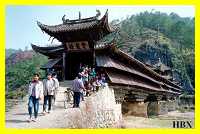
I also want to travel further up the Tufang road to XuanChengXiang (ĐűłÇĎç)
Hamlet, which has the marvelous Eternal Dragon (ÓŔÁúÇĹ) wooden
covered bridge. Maybe some day IˇŻll even accept BabushkaˇŻs invitation
to rent a farmerˇŻs home for the summerˇŞprovided it has A/C and cable
TV.
 SinoPec
and Porcelain Unless they need gasoline, most people speed
right past the SinoPec beside the 319 HighwayˇŻs 317.2 km marker. But
beside the station is a brick kiln. Behind the kiln is a nondescript hill
where once lurked a dragon kiln. The hill is an archaeological treasure
trove of 800-year-old North Song dynasty pottery. Bare rings on the mountains
two kilometers up the road were not UFO landing sites or crude crop circles,
but the sites where the ancients mined kaolin (from the Chinese word ˇ°Gaolinˇ±)ˇŞcrucial
to porcelain production.
SinoPec
and Porcelain Unless they need gasoline, most people speed
right past the SinoPec beside the 319 HighwayˇŻs 317.2 km marker. But
beside the station is a brick kiln. Behind the kiln is a nondescript hill
where once lurked a dragon kiln. The hill is an archaeological treasure
trove of 800-year-old North Song dynasty pottery. Bare rings on the mountains
two kilometers up the road were not UFO landing sites or crude crop circles,
but the sites where the ancients mined kaolin (from the Chinese word ˇ°Gaolinˇ±)ˇŞcrucial
to porcelain production.
It just goes to show that in a 5,018-year-old country,
every hillside is probably an archaeological treasure trove.
(We will visit a restored dragon kiln in Wuyi Mountain).
Caution: all ancient
artifacts are, in theory at least, turned over to the government. But
locals sometimes forget theory, and at times inadvertently sell a bowl
or three. I wouldnˇŻt advise buying them though. Antiques are sold quite
legally in many major cities like Xiamen, Quanzhou and Fuzhou.
Hetian Hot Tubs & Chickens Near
the 320 km marker I turned  south
into Hetian Town. I took the left fork, which was just as well since a
green mini bus was parked diagonally in the middle of the right fork.
We hung a right at the market and Toy Ota squirmed between stalls offering
pork, veggies, various fungi, dried herbs, a dozen varieties of tofu,
and the famed Hetian chickens, who were still strutting and fretting across
the stage , mindless of their mortality. I parked in a broad plaza and
we walked to the hot springs, where one fellow scraped a dead pig in the
boiling water and another rinsed his veggies.
south
into Hetian Town. I took the left fork, which was just as well since a
green mini bus was parked diagonally in the middle of the right fork.
We hung a right at the market and Toy Ota squirmed between stalls offering
pork, veggies, various fungi, dried herbs, a dozen varieties of tofu,
and the famed Hetian chickens, who were still strutting and fretting across
the stage , mindless of their mortality. I parked in a broad plaza and
we walked to the hot springs, where one fellow scraped a dead pig in the
boiling water and another rinsed his veggies.
A Bath A Dayˇ Hetian villagers bathe daily because 1) the water supposedly cures all skin diseases, and 2) itˇŻs free. Women bathe in a pool behind the pig scraper, but I didnˇŻt check it out. Behind a wall to the left were at least 40 male par-boiled bodies ranging in age from 5 to 95. Some were submerged up to their necks, others stood about absently as if their brains had boiled too long. Fully clothed, I felt more self-conscious than the dozens of par-boiled bodies staring at me. One ancient scarecrow of a man muttered, ˇ°Even foreigners are coming here now.ˇ±
Each of the 20 or
so Hetian Hakka clans has a ceremonial round stone tub. Babushka animatedly
explained that these are where brides-to-be are bathed. Perhaps heˇŻs
still dreaming of photographing a bona fide bride to replace his 5-cent
photo of the 12-year old.
Changting people also enjoy the therapeutic springs. Every Sunday, dozens
of city folk take the 20-minute jaunt in a 3 Yuan green minibus to spend
the day in Hetian. They bathe as long as they can stand it, anywhere from
mere minutes to an hour or two. Then they have a hot lunch of noodles
and HeTian chicken and head home. The entire outing may cost no more than
20 yuan for a family. Good clean funˇŞas long as the pigs and the people
are scalded separately.
Chinese Viagra After a short
break at the Hakka Guesthouse, we dined at Linjia Restaurant (ÁµĽŇ·ąµę)
a small place run by my companionˇŻs friend. Small, maybeˇŞbut the food
was excellent, and inexpensive. Try them! (Address: Ő×Ő÷· 106şĹ--#106,
ZhaoZheng Rd.).
We ate in a small room at the top of the narrow wooden steps. The proprietor
immediately set out several small bottles of an alcoholic beverage before
my host, who reassured me, ˇ°You need not drink this, but IˇŻve been away
from home for awhile and will need it tonight.ˇ±
ˇ°Why?ˇ±
He laughed. ˇ°This is ChinaˇŻs Viagra!ˇ±
I thought heˇŻd visited Guanzai MountainˇŻs ˇ°Root of Lifeˇ± once too
often.
I read the ingredients: essences of dog, deer, mountain goat, and everything
else. But with 35% alcohol, IˇŻd think heˇŻd need to strike a balance
between virility and veering off the bed.
Maybe ChangtingˇŻs Red Army supplemented Red Army Cola with this Chinese
Viagra, and the Long March spread its use to the rest of China. It would
explain the populationˇŻs growth from 400 million to 1.3 billion.
Home
Cooking Linjia Restaurant was not much to look at, but
the food equaled that in the best local hotels. I enjoyed the laid-back,
homey atmosphere as we feasted on various dishesˇŞexquisite Changting
tofu, BBQ beef ribs with cilantro, and tiny two-inch long deep-fried fishˇŞbones
and all. ˇ°These are ˇ®greenˇŻ foods!ˇ± My host explained. ˇ°Clean air,
clean water!ˇ±
The corn soup had strips of what resembled boiled bicycle tires with white
walls. I wasnˇŻt surprised to learn it was snake. Tires arenˇŻt as tough.
The BBQ cow hooves were a first for me. IˇŻve had pickled piggy toes but
never munched on cow toes.
When the serious after-dinner drinking began I excused myself to phone
Susan Marie, buy some oil pork floss rolls for breakfast, and spend the
evening scanning BabushkaˇŻs photos into my computer. Then I hit the bed,
which hit right back. It was harder than a board. I found a fluffy Chinese
coverlet in the closet, but I couldnˇŻt decide if to sleep on it and be
comfortable but cold or under it and be warm and bruised. I had barely
nodded off when I was awakenedˇŞbut this time not by loudspeakers.
Rise
and Smoke
My second morning I was roused from bed at not at 6:00 AM but 5:30 by
the TV blaring from the room across the hall. My neighbors had kindly
left their door open to allow everyone to enjoy the predawn racket, and
to let their cigarette smoke dissipate.
Chinese claim they are ˇ®sons of the dragon.ˇŻ IˇŻm not sure if this dragon
breathes fire or not but its sons sure smoke. China has more smokers than
America has people, and the entire nation has but two divisions: Smoking
Areas, and Passive Smoking Areas.
Flood
Control I slammed my door shut and crammed my earplugs
in deeperˇŞand then the loudspeakers began. This was followed by ten minutes
of fireworks. I read the writing on the wall and decided to take a bath.
And then I discovered why Changting folk flock to Hetian every Sunday.
I complained about the lack of hot water to the maid and she said, ˇ°Let
it run awhile.ˇ±
ˇ°ItˇŻs run 15 minutes already!ˇ± I complained.
ˇ°Try a few minutes longer,ˇ± she said.
Changting had a killer flood in 1996, so maybe this is all part of a strategy
to help keep the river in check I probably lowered the water table by
3 feet just trying to get a hot bath. I finally gave up and took a cold
shower, which I thought wasnˇŻt entirely fair since I wasnˇŻt the one
who had overdosed on Chinese Viagra.
The Last Supper After checking
out and settling accounts, I had my last supper. Actually, it was lunch,
but IˇŻm taking a little illiterary leeway here. We dined at the Changting
Guesthouse (ł¤Íˇ±öąÝ), whose cook has more medals than a Vietnamese general.
ChangtingˇŻs premier hotel, which just had a 2 million Yuan facelift,
opened in 1979 for foreign barbarians and domestic big potatoes, and not
until 1988 could the masses mess around the place.
The manager said Changting BinguanˇŻs location is perfect, with the Wu
Long Mountain in back, Nan Ping Mountain in Front, and the MartyrˇŻs Memorial
next door (which insures guests sleep like the dead? ).
After a memorable meal, though I donˇŻt remember what we had, we browsed
Changting specialties in the tourist shop.
I was offered ˇ°7 Wolf cigarettes,ˇ± six-packs of Red Army Cola, ChangtingˇŻs
famous dried tofu, preserved plums, dried mushrooms and fungi, black porcelain
(both Song Dynasty antiques and reproductions), and heat-and-serve vacuum
packed foil pouches of MaoˇŻs beloved pork and pickled vegetables, as
well as Yanjiu Chicken. I thought of sending some home to my folks but
getting the fowl through U.S. customs would be no poultry undertaking.
Caveat Emptor! I told the management that transparent packages labeled ˇ°Wild Mushroomsˇ± in fact contained dried bamboo shoots. She responded, ˇ°It doesnˇŻt matter. Anyone can see theyˇŻre bamboo, not mushrooms.ˇ± Soˇ caviar empty. Or something like that.
Farewell,
Little Red Shanghai. No wonder Rewi Alley fell in love
with the town. ItˇŻs not just the mystical mist-enshrouded mountains and
the ancient Hakka architecture, but the people. I can see why Changting
maidens monopolize beauty pageants, and why Hakka men tussle over a 330
pound Buddha to win their favor. But I can also see why the girls like
the men. One youth on a motorcycle had such a clear complexion and square
jaw (even the movie starˇŻs dimple!) that he could have given Mel Gibson
a run for his money.
But West FujianeseˇŻ beauty is not just skin deep. Their pride and self-confidence
explain why West Fujian was home not just to the many Hakka who have excelled
abroad, but to New ChinaˇŞwhich paradoxically is both one of the oldest
and one of the newest nations on earth.
West FujianˇŞthe Hakka Homeland and Cradle of Chinese Communism. Next
time I visit Little Red Shanghai, IˇŻm going to take my shoes off and
stay awhile! ...
P.S. DonˇŻt miss these great Changting Sites!
Source of the Ting River
Ancient Well
(ŔϹž®Laogu Jing)
ChangtingˇŻs oldest well, considered a miracle because it never dries
up, whatever the conditions. On top of that, while Mao ZeDong lived in
Changting, every morning he used the well to wash his face, brush his
teeth, and clean his clothes (not necessarily in that order). And to make
the well healthier, he brought in a well specialist, which I thought was
a well-meaning gesture.
Tingzhou Hakka Research Institute (ÖĐąú͡Ö޿ͼŇŃĐľżÖĐĐÄ Zhongguo Tingzhou Kejia Yanjiu Zhongxin)
Tingzhou
Ancient City Wall (͡Ö޹ųÇÇ˝Tingzhou Gucheng Qiang)
Tang Dynasty, at least 1200 years old.
Dragon Hill against White Clouds (ÁúÉ˝°×ÔơŞLongshan Baiyun) ¨C the Jin Sha Temple.
Zhongshan
Park and the Qiu Bai Pavilion (Çď°×ͤ Qiubai Ting).
Every two-ox town in China has a Zhongshan Park (named after Sun Yat-sen,
but called Lenin Park during the Soviet Chinese days). The Qiu Bai Pavilion
is named after Qiu Bai, the young revolutionary martyr. To the rear of
the Hakka Museum you can see where he was imprisoned, and where he was
shot.
Hakka Girls. TheyˇŻre everywhere. Please just take photos, not the girls.
Chaodou RockˇŻs
Shuiyun Temple. The Buddha is said to have his back to tourists
because heˇŻs piqued that so few people repent and begin life anew.
Xiamen UniversityˇŻs Former Campus (ĎĂĂĹ´óѧУ±ľ˛żľÉÖ·)
A Xiamen
University professor told me China had 5000 years of history but that
was 18 years ago, so now its 5018 years of history.
And 3 months.
![]() Favorite
Fujian Sites
Favorite
Fujian Sites ![]() Fujian
Foto Album
Fujian
Foto Album ![]() Xiamen
Xiamen
![]() Gulangyu
Gulangyu
![]() Fujian
Guides
Fujian
Guides ![]() Quanzhou
Quanzhou
![]() Zhangzhou
Zhangzhou
![]() Longyan
Longyan
![]() Wuyi
Mtn
Wuyi
Mtn ![]() Ningde
Ningde
![]() Putian
Putian
![]() Sanming
Sanming
![]() Zhouning
Zhouning
![]() Taimu
Mtn.
Taimu
Mtn. ![]() Roundhouses
Roundhouses
![]() Bridges
Bridges
![]() Jiangxi
Jiangxi
![]() Guilin
Guilin
![]() Order
Books
Order
Books
![]() Readers'
Letters
Readers'
Letters
Last Updated: May 2007
![]()
DAILY
LINKS
![]() FAQs
Questions?
FAQs
Questions?
![]() Real
Estate
Real
Estate
![]() Shopping
Shopping
![]() Maps
Maps
![]() Bookstores
Bookstores
![]() Trains
Trains
![]() Busses
Busses
![]() Car
Rental
Car
Rental
![]() Hotels
Hotels
![]() News
(CT)
News
(CT)
![]() Medical
& Dental
Medical
& Dental
![]() YMCA
Volunteer!
YMCA
Volunteer! ![]()
![]() XICF
Fellowship
XICF
Fellowship
![]() Churches
Churches
![]()
![]()
![]() Temples
Temples![]()
![]() Mosque
Mosque
![]() Expat
Groups
Expat
Groups
![]() Maids
Maids
![]() Phone
#s
Phone
#s
EDUCATION
![]() Xiamen
University
Xiamen
University
![]() XIS(Int'l
School)
XIS(Int'l
School)
![]() Study
Mandarin
Study
Mandarin
![]() CSP(China
Studies)
CSP(China
Studies)
![]() Library
Library
![]() Museums
Museums
![]() History
History
DINING
![]() Restaurants
Restaurants
![]() Asian
Asian
![]() Veggie
Veggie
![]() Junk
Food
Junk
Food
![]() Chinese
Chinese
![]() Italian
Italian
![]() International
International![]()
![]() Visas
4 aliens
Visas
4 aliens
RECREATION
![]() Massage!
Massage!
![]() Beaches
Beaches
![]() Fly
Kites
Fly
Kites
![]() Sports
Sports
![]() Boardwalk
Boardwalk
![]() Parks
Parks
![]() Pets
Pets
![]() Birdwatching
Birdwatching
![]() Kung
Fu
Kung
Fu ![]() Hiking
Hiking
![]() Music
Events
Music
Events
![]() Festival&Culture
Festival&Culture
![]() Humor&
Humor&![]() Fun
Fotos
Fun
Fotos![]()
BUSINESS
![]() Doing
Business
Doing
Business
![]() Jobs!(teach/work)
Jobs!(teach/work)
![]() Hire
Workers
Hire
Workers
![]() Foreign
Companies
Foreign
Companies
![]() CIFIT
(Trade Fair)
CIFIT
(Trade Fair)
![]() MTS(Translation)
MTS(Translation)
![]()
Back to Top
